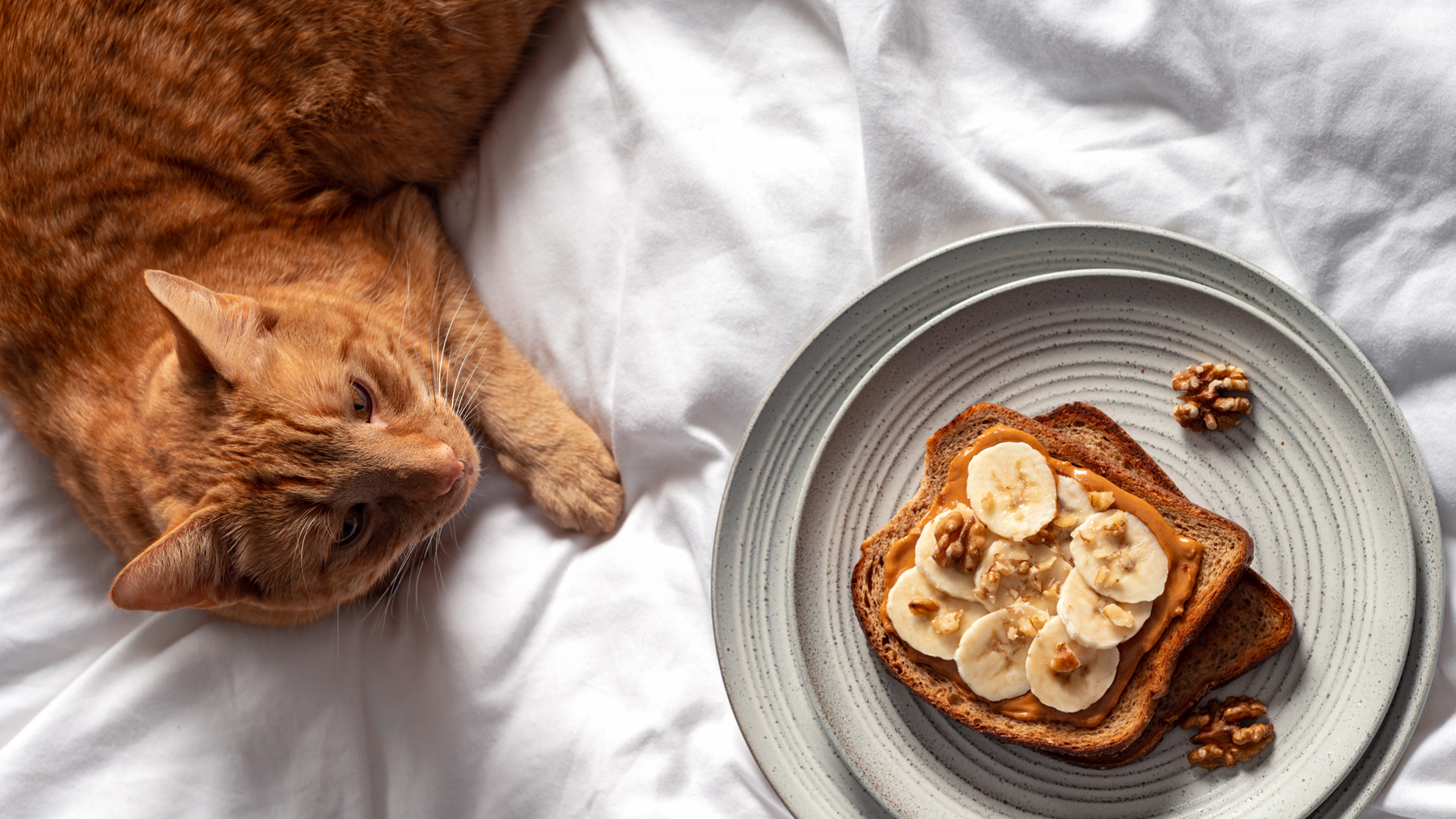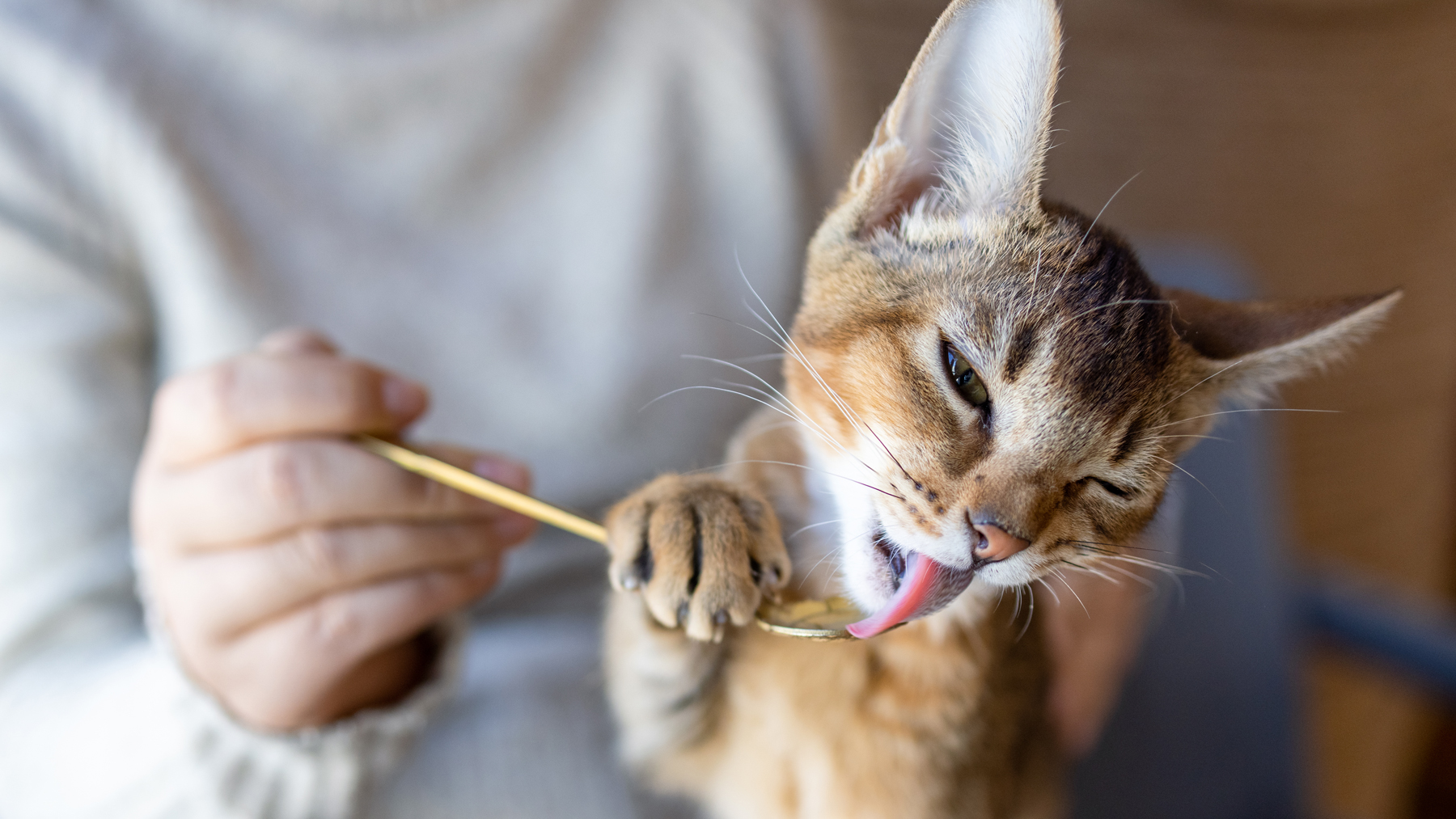Can cats have peanut butter?
Spotted your cat eyeing up a jar of PB and wondering can cats have peanut butter? We spoke to a vet to find out…

Get the best advice, tips and top tech for your beloved Pets
You are now subscribed
Your newsletter sign-up was successful
Can cats have peanut butter? This is something many cat owners will have weighed up if they’ve ever opened up a jar of peanut butter ready to lather it all over some toast and clocked their cat eyeing it up or sniffing around for any fallen remnants. While it may seem appealing to them, it isn’t the best treat you could reward your kitty with and could pose threat to their health.
Even pet owners who buy the very best wet cat food or best dry cat food for their cats will still want to spoil their fur friends with tasty treats. Buying cat treats on the regular can become very costly, so it’s no wonder many people search for ‘what human foods can cats eat?’ and help save pennies where they can. One pantry item that many people want to find out whether or not it’s safe or not for a cat to eat is peanut butter.
It’s not a straightforward yes or no answer as to whether cats can or can’t have peanut butter so we’ve done some digging for you and approached qualified vet, Dr Joanna Woodnutt, on this one to unveil the 101 on feeding your cat peanut butter. Read on to find out…

Dr Joanna Woodnutt specializes in helping clients understand their pets better. After graduating as a veterinarian from the University of Nottingham, Dr Woodnutt went on to practice companion animal medicine in the Midlands. She soon developed a love of consulting and helping clients with medical problems such as dermatology, behavior, and nutrition.
Can cats have peanut butter? A vet’s opinion
There are a few foods cat owners will second guess feeding to their feline friends and peanut butter is a common one that pops up. We asked trained vet, Dr Joanna Woodnutt, for her medical expertise on this one and she laid down the hard facts for all the PB-loving cats out there.
According to Woodnutt, peanut butter isn’t inherently toxic to cats but it can be bad for them. She explains, “Peanut butter is extremely high in calories, with one tablespoon containing about 95 calories, which is half of a cat’s daily calorie allowance! This means that even a tiny amount of peanut butter each day could cause weight gain and unbalance their diet, risking nutritional problems.”
Regularly feeding your cat highly caloric foods such as peanut butter can eventually lead to obesity. Woodnutt adds that obesity in cats can result in additional health scares such as diabetes, arthritis, skin problems, and reduced life expectancy.
Another important reason why cat owners should be cautious of allowing their cats peanut butter is the additives that make up many of these popular nut butters. Especially Xylitol, which is sometimes added to peanut butter and Woodnutt says is extremely toxic to cats.
Get the best advice, tips and top tech for your beloved Pets
To answer the question of whether or not cats can have peanut butter is yes but only under very specific circumstances. 1) Your cat should be getting all of its essential nutrients from its diet in other words from the cat food you put in their bowl - and if you want to treat them to some peanut butter, only allow them a small amount like a teaspoon full and avoid making this a frequent treat. 2) Avoid any peanut butter with Xylitol listed in the ingredients.

What ingredients in peanut butter are harmful to cats?
It turns out, as well as xylitol, there are a few more problematic ingredients included in various peanut butters that cat owners will want to keep an eye out for. Here’s a rundown on the main harmful ingredients found in peanut butter and why they don’t agree with cats…
Xylitol
As mentioned above, the artificial sweetener xylitol is toxic to cats - not just cats, dogs, and other animals as well. This harsh ingredient can cause nasty side effects such as drooling, tiredness, and vomiting. It can also be found in other human foods that a cat could get their paws on such as mints and baked goods.
Sodium
Most natural peanut butters won’t include sodium but any options made from roasted peanuts will often be high in sodium. According to the American Society for the Prevention of Cruelty to Animals (ASPCA) feeding your cat foods that are high in salt can lead to excessive thirst and urination or in worse cases, cause sodium poisoning in cats.
Oil and fat
Peanuts are very high in oil and fat. If a cat is exposed to high levels of these ingredients on a regular basis, they are put at greater risk of becoming overweight or obese and facing larger health issues as a result. The ASPCA include nuts in their list of foods people shouldn’t feed to their pets claiming they can cause diarrhea, vomiting, and even pancreatitis.
What should I do if my cat eats peanut butter?
First and foremost, don’t slip into panic mode. They may not have had enough for any harm to be caused to their insides or they may have eaten from a jar of peanut butter that was made from more natural ingredients with low levels of additives or additional fats included. However, it’s in your cat’s best interest for you to call up your local vet or someone like the Animal Poison Control Center just to ensure whether or not you should take your cat for in-person medical assistance.
What can I treat my cat to instead of peanut butter?
Don’t feel bad for keeping all your peanut butter to yourself. There are plenty more foods you can treat your cat to instead - the most obvious being any of the options from our guide to the best cat treats.
Or if your cat loves to lick from a spoon then Woodnutt suggests using a liver paste designed for pets. She notes, “Don’t use human liver pastes or pates though - these usually contain onions, which are toxic.”

It’s safe to say that peanut butter isn’t the most nutritious or safe food to feed your cat. Even though your kitty may like the look of it on your toast or sniff eagerly at your packet of chocolate peanut butter cups - the cost of potentially poisoning your cat or increasing their chance of becoming overweight really isn’t worth it.
If you want to find out more about a cat’s dietary needs, we’ve got the answers to can cats eat dog food, what to do if your cat is throwing up, and Can cats eat corn?

Jessica holds a journalism degree from Cardiff University and has authored articles for renowned publications, including PetsRadar, Fit&Well, LiveScience, Runner's World, The Evening Express, and Tom's Guide. Throughout her career in journalism she has forged connections with experts in the field, like behaviorists, trainers, and vets. Through her writing, Jessica aims to empower pet owners with accurate information to enhance their furry companions' lives.
